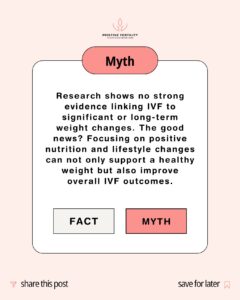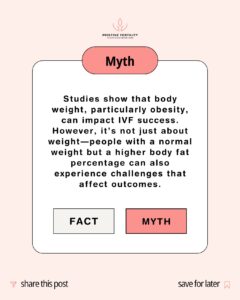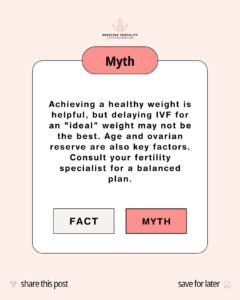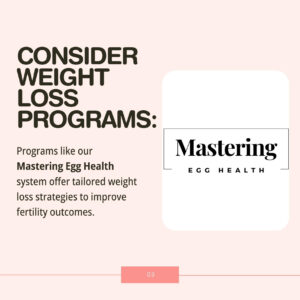The Truth About IVF and Weight Gain
For many individuals on their fertility journey, in vitro fertilisation (IVF) offers hope and possibility. Yet, questions about how IVF and weight gain are connected often lead to confusion and stress. Does weight affect IVF success? Can IVF treatments cause significant weight gain? Should you wait to reach an “ideal” weight before starting treatment?
In this post, we’ll uncover the truth about IVF and weight gain, debunk common myths, and share actionable, evidence-based tips to help you feel informed and confident at every step.
Myth 1: “IVF Causes Significant Weight Gain”
It’s a common worry that the hormone therapy involved in IVF will lead to substantial weight gain. However, research consistently shows this is more myth than fact.
A 2024 study by Saar-Ryss et al. found that weight changes during IVF treatment were minimal, with average fluctuations accounting for less than 1% of body weight across three cycles. These changes were largely attributed to temporary bloating or water retention caused by hormones.
What does this mean for you?
If you’re experiencing bloating or temporary weight fluctuations during treatment, rest assured they are normal and typically short-lived. Discussing dietary adjustments with a fertility dietitian can help you feel more comfortable during this phase.

Myth 2: “Weight Has No Impact on IVF Success”
While it’s comforting to believe weight doesn’t matter, the truth is more nuanced. Evidence suggests that body weight, particularly obesity, can influence IVF outcomes. However, the story doesn’t end there—positive changes are possible.
How Obesity Affects IVF Outcomes
Obesity is often associated with:
- Hormonal imbalances
- Insulin resistance
- Increased inflammation
These factors can impact egg quality, implantation rates, and pregnancy success. For example, a 2022 study by Wu et al. found that losing just 5 kg before IVF significantly improved ovarian responsiveness, embryo quality, and live birth rates in women with PCOS. Obesity may reduce uterine receptivity, leading to lower implantation rates. Higher BMIs are linked to lower pregnancy and live birth rates in some studies.
Beyond BMI: Normal Weight Obesity
Not all weight-related fertility challenges are visible on a scale. Normal weight obesity (NWO)—a condition where individuals have a normal BMI but a high body fat percentage—has been linked to poor IVF outcomes.
A 2024 study by Yao et al. revealed that women with NWO often experience lower ovarian reserves and poorer IVF success despite appearing to be at a healthy weight. This underscores the importance of looking beyond BMI and considering body composition and metabolic health.
Pro Tip: Working with a fertility dietitian can help uncover hidden factors affecting your fertility and create a tailored nutrition plan to optimise your health.

Myth 3: “Delay IVF Until Ideal Weight Is Achieved”
While achieving a healthy weight is beneficial, waiting indefinitely to reach an “ideal” weight isn’t always the best choice. Factors like age and ovarian reserve play critical roles in fertility, and delaying IVF can sometimes do more harm than good.
A Balanced Approach
A 2023 study by Fouks et al. suggests a practical solution: proceeding with embryo freezing during IVF cycles, followed by weight management before transfer. This approach allows you to preserve fertility potential while improving your overall health.
Higher BMI pre-pregnancy is associated with increased risks during pregnancy, including:
- Gestational diabetes
- Gestational hypertension
- Delivery complications, including preterm birth and cesarean section.
Key Takeaway: The decision to delay or proceed with IVF should be personalised in discussion with your fertility specialist, balancing age, ovarian reserve, and fertility treatment safety considerations.

Strategies for Optimising Weight and IVF Outcomes
- Seek Professional Guidance: Develop a personalised plan with a fertility dietitian. Tailored strategies can make a significant difference.

- Focus on Lifestyle Changes
- Prioritise balanced nutrition.
- Incorporate regular physical activity.
- Practice stress management techniques.

- Consider Fertility Dietitian guided Weight Loss Program: Programs like our 12-week Mastering Egg Health Program provide personalised weight loss strategies, focusing on improving fertility and optimising egg quality.

- Monitor Body Composition: Beyond BMI, tools like body composition analysis offer a more comprehensive picture of health.

- Support Mental Health: Infertility and IVF can be emotionally taxing. Addressing these challenges can improve both emotional well-being and treatment outcomes.

Bottom Line
- Weight optimisation before IVF can enhance IVF success rates, improve pregnancy outcomes, and reduce risks of pregnancy complications.
- Temporary weight fluctuations during IVF are expected.
- Delays for weight management should be balanced with age and ovarian reserve to maximise reproductive potential.
Ready to Take the Next Step?
At Pristine Fertility, we specialise in evidence-based nutrition strategies to support fertility, egg health, and overall well-being. Book a fertility nutrition assessment today to create a tailored nutrition and lifestyle plan that works for you.
